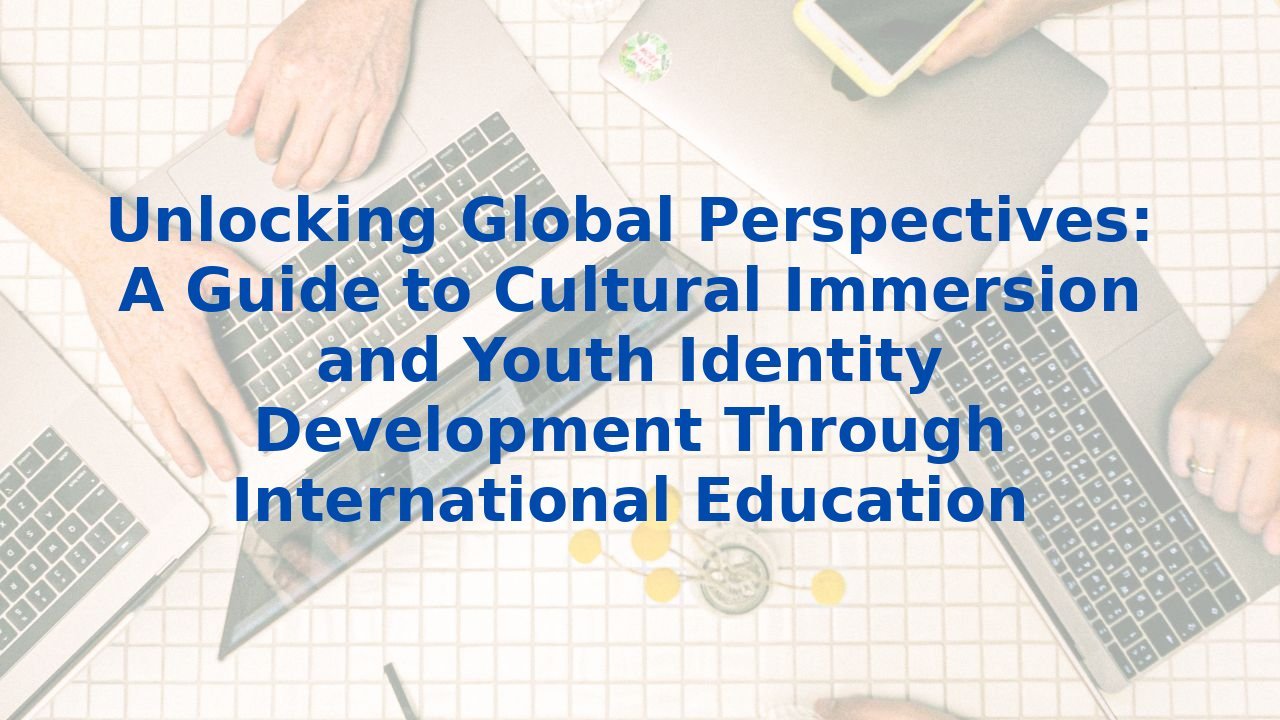Unlocking Global Perspectives: A Guide to Cultural Immersion and Youth Identity Development Through International Education
Unlocking Global Perspectives: A Guide to Cultural Immersion and Youth Identity Development Through International Education
In an ever-globalized world, the intersection of culture and education creates a fertile ground for youth identity development. International education is not just a means to an academic end; it’s a holistic journey of self-discovery through cultural immersion. It offers young individuals an unparalleled opportunity to step outside their comfort zones, fostering resilience, adaptability, and a global outlook that is essential in today’s interconnected society.
The Essence of Cultural Immersion
Cultural immersion goes beyond mere exposure to another culture; it involves a deep, experiential understanding of the customs, values, and lifestyles that shape a community. Participants in international education programs have the unique opportunity to engage meaningfully with diverse cultures, prompting a transformation within themselves. They learn not just to observe, but to actively participate in the cultural tapestry surrounding them.
“To travel is to discover that everyone is wrong about other countries.” – Aldous Huxley
This profound learning enables youth to reevaluate their identities and develop a more nuanced understanding of the world. It challenges preconceived notions, nurtures empathy, and ultimately leads to personal growth. With such transformative experiences, students emerge as confident global citizens ready to impact their communities positively.
The Role of International Education in Youth Identity Development
International education acts as a catalyst for identity formation. As young individuals navigate new environments, they encounter situations that compel them to think critically about their own beliefs and values. This process fosters self-reflection and encourages the exploration of identities in ways that are often not possible in their home environments.
Through interactions with peers from diverse backgrounds and participation in local customs, students learn to appreciate the richness of diversity. They begin to understand that their identity is not static but rather a fluid construct influenced by experiences and cultural exchanges. Such realizations lead to greater self-awareness and an enriched perspective on their place in the world.
Embracing AI to Enhance International Education
In this digital age, the integration of Artificial Intelligence (AI) into international education presents an exciting frontier for enhancing cultural immersion experiences. AI can support educators in personalizing learning journeys, ensuring that students are not just passive recipients of information but active participants in their development.
AI for Tailored Learning Experiences
Imagine a student embarking on an international program where their learning path is tailored to their unique interests and cultural backgrounds. AI algorithms can analyze student preferences and adapt the curriculum accordingly, facilitating a more meaningful engagement with the cultural context. This personalized approach empowers students to delve deeper into areas of interest, thereby enriching their learning experience.
AI in Language Learning
Language barriers pose a significant challenge in international education. AI-driven language learning tools can help students overcome these barriers by providing real-time translations and immersive language practice. This enhances their ability to communicate effectively with peers and local communities, further enriching their cultural immersion and aiding in relationship-building.
The Benefits of Training Educators in AI
As organizations and educational institutions look to integrate AI tools, training educators on how to effectively use these technologies becomes critical. When educators are well-equipped with AI skills, they can:
- Enhance the Learning Environment: Trained educators can employ AI to create interactive and engaging learning environments, optimizing student engagement.
- Create Inclusive Programs: Understanding AI allows educators to develop programs that cater to diverse learning styles, ensuring every student can thrive.
- Make Data-Driven Decisions: Educators trained in AI can analyze student performance metrics, enabling timely interventions to support students in their cultural journey.
Conclusion
The transformative power of international education cannot be overstated. By immersing youth in diverse cultures, we empower them not only to develop their identities but also to foster global citizenship. As we explore the integration of AI within this educational landscape, we unlock new pathways to enhance the learning experience, ensuring it is as impactful as possible. With proper training and resources, educators can leverage AI to guide students through this inspiring journey of self-discovery and cultural enrichment, ultimately shaping a generation poised to navigate and thrive in an interconnected world.



